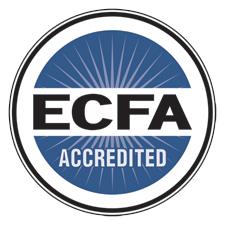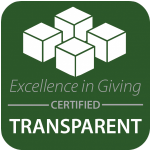COVID-19:
Provide crucial support for Children’s HopeChest during the coronavirus pandemic.
How can I help Children’s HopeChest prevent the spread of COVID-19 and provide relief for impoverished communities?
Stand with Children’s HopeChest by equipping us to respond quickly and proactively to COVID-19’s impact on the vulnerable communities we partner with. By giving a gift where it is needed most, you empower HopeChest to provide support to local needs and our CarePoints overseas that are bracing for potential impact. Your generous donation will provide critical resources to help keep children and their families healthy.
How is Children’s HopeChest helping to prevent the spread of COVID-19 in impoverished communities?
HopeChest’s number one priority is the health and wellbeing of CarePoint children, in-country staff, parents, guardians, and communities.
- Implementation of enhanced detailed hygiene procedures and COVID-19 awareness-trainings at CarePoints.
- Increasing distance between CarePoint staff members in offices where they are still working in-person
- Proactive operational plans and procedures for the CarePoints, including minimizing gathering sizes, food and soap distribution, and keeping communication open between CarePoint staff and those we serve.
- Awareness of news of the virus from reputable news sources. Country Directors are on “full alert” to news about COVID-19 as it pertains to their country.
Below are country updates which share the precautions currently taken by the countries we serve, and how CarePoints are responding in their communities.
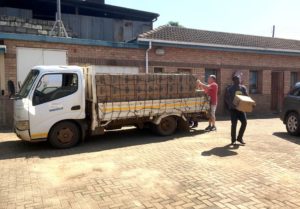 In Eswatini the country is still in lockdown, although towns feel like business as usual. Schools are still not in session, and they’re not sure when they will return. Hands-free hand washing stations have been set up at CarePoints. Currently, HopeChest Eswatini is testing out partial-reopening of three CarePoints, which involves small group meetings (under 10 people) and nutrition support. Some CarePoint Coordinators have returned part-time to the CarePoints, but overall there is little happening at most of the CarePoints. The Swazi Leadership Academy is continuing programming.
In Eswatini the country is still in lockdown, although towns feel like business as usual. Schools are still not in session, and they’re not sure when they will return. Hands-free hand washing stations have been set up at CarePoints. Currently, HopeChest Eswatini is testing out partial-reopening of three CarePoints, which involves small group meetings (under 10 people) and nutrition support. Some CarePoint Coordinators have returned part-time to the CarePoints, but overall there is little happening at most of the CarePoints. The Swazi Leadership Academy is continuing programming.
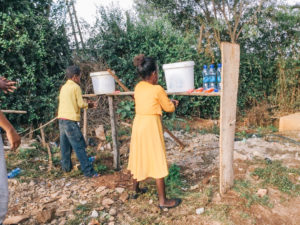 So far none of the children at our Ethiopia CarePoints have tested positive. Ethiopia is not on lockdown, although the government is encouraging everyone to stay home to keep safe. CarePoints are now open all of the week days, and have preventative measures in place like hand-washing stations. Income-generating programs have temporarily suspended and will run again when it is a more favorable time. Most CarePoints have distributed hygiene materials, and some CarePoints distributed nutritional support for vulnerable families.
So far none of the children at our Ethiopia CarePoints have tested positive. Ethiopia is not on lockdown, although the government is encouraging everyone to stay home to keep safe. CarePoints are now open all of the week days, and have preventative measures in place like hand-washing stations. Income-generating programs have temporarily suspended and will run again when it is a more favorable time. Most CarePoints have distributed hygiene materials, and some CarePoints distributed nutritional support for vulnerable families.
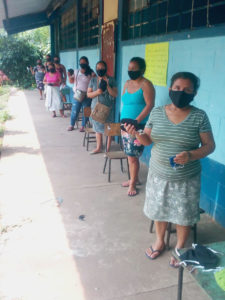 Guatemala’s national, mandatory curfew remains in place, running from 6:00 p.m. each evening through 5:00 a.m. the following day. In addition, an extended curfew will be in place on weekends. The government urges individuals to avoid travel between Escuintla, Sacatepequez, Suchitepequez, Izabal, El Progreso, Zacapa, Santa Rosa, and Quetzaltenango. All individuals must wear masks in all public spaces, and failure to comply with this requirement will result in fines of up to 150,000 quetzales. The Guatemalan government is currently barring entry to most non-Guatemalans from entry into the country. Commercial flights out of Guatemala and public transportation have both been suspended.
Guatemala’s national, mandatory curfew remains in place, running from 6:00 p.m. each evening through 5:00 a.m. the following day. In addition, an extended curfew will be in place on weekends. The government urges individuals to avoid travel between Escuintla, Sacatepequez, Suchitepequez, Izabal, El Progreso, Zacapa, Santa Rosa, and Quetzaltenango. All individuals must wear masks in all public spaces, and failure to comply with this requirement will result in fines of up to 150,000 quetzales. The Guatemalan government is currently barring entry to most non-Guatemalans from entry into the country. Commercial flights out of Guatemala and public transportation have both been suspended.
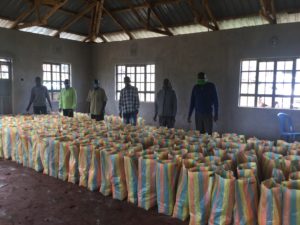 There are no official dates set to reopen schools, but they will reopen with older kids first who are scheduled to sit for national exams this year. CarePoint staff are meeting with 15 children at a time (30 children per day), three times per week. These meetings include discipleship (VBS), counseling, and arts and crafts with the small children. Hellen and Richard go to the CarePoint two times per week to work with the CarePoint Coordinator and meet with guardians. They work in groups of 15 people, organized by geographic location, and are able to provide business courses to promote animal husbandry and agriculture. At the end of the meetings with guardians, food (for their families) and masks are handed out. This is part of the COVID Food Relief Fund.
There are no official dates set to reopen schools, but they will reopen with older kids first who are scheduled to sit for national exams this year. CarePoint staff are meeting with 15 children at a time (30 children per day), three times per week. These meetings include discipleship (VBS), counseling, and arts and crafts with the small children. Hellen and Richard go to the CarePoint two times per week to work with the CarePoint Coordinator and meet with guardians. They work in groups of 15 people, organized by geographic location, and are able to provide business courses to promote animal husbandry and agriculture. At the end of the meetings with guardians, food (for their families) and masks are handed out. This is part of the COVID Food Relief Fund.
So far none of the children at our Moldova CarePoints have tested positive. Moldova has closed its schools and businesses and the country is in quarantine. Beginning of Life has closed its programs and operations. Both Serghei, Moldova Country Director, and his wife had coronavirus, but are now recovered and glad to have the experience behind them.
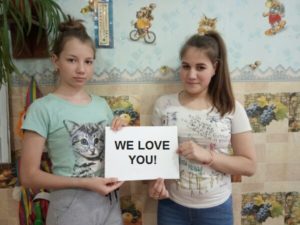 The isolation period in the Vladimir and Kirov regions are still active, but the Kostroma region is slowly opening up again. CarePoint staff have been working from home, but keeping in touch with each participant and conducting weekly individual and group ZOOM calls. The staff has been also providing food for the vulnerable participants, as well as baby diapers and other necessities for the young mothers. The isolation period has been more difficult for the orphanages, because they are not equipped for group online communication and this made it challenging to finish the academic year due to a shortage of computers and smartphones.
The isolation period in the Vladimir and Kirov regions are still active, but the Kostroma region is slowly opening up again. CarePoint staff have been working from home, but keeping in touch with each participant and conducting weekly individual and group ZOOM calls. The staff has been also providing food for the vulnerable participants, as well as baby diapers and other necessities for the young mothers. The isolation period has been more difficult for the orphanages, because they are not equipped for group online communication and this made it challenging to finish the academic year due to a shortage of computers and smartphones.
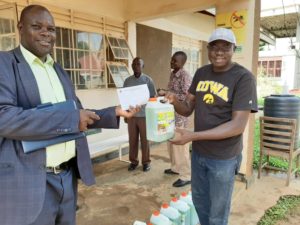 In Uganda, school exams may not happen this year because students have lost a lot of time and won’t be prepared for exams. The government recently launched six factories to produce radios to give to families so that they can receive education for their children. CarePoint Coordinators and staff are back at all CarePoints, overseeing and helping with life-threatening situations (food, medical), which is how CarePoints are supporting the community. Management Committees continue to meet in small, distanced groups. Uganda head office staff continue to visit CarePoints to check in and make sure they have what they need, like masks and sanitizers. VSLA projects are still continuing at most CarePoints, only five people at a time. Other projects like liquid soap making, aluminum molding, welding workshops, sewing masks in tailoring schools, and agricultural programs are still running.
In Uganda, school exams may not happen this year because students have lost a lot of time and won’t be prepared for exams. The government recently launched six factories to produce radios to give to families so that they can receive education for their children. CarePoint Coordinators and staff are back at all CarePoints, overseeing and helping with life-threatening situations (food, medical), which is how CarePoints are supporting the community. Management Committees continue to meet in small, distanced groups. Uganda head office staff continue to visit CarePoints to check in and make sure they have what they need, like masks and sanitizers. VSLA projects are still continuing at most CarePoints, only five people at a time. Other projects like liquid soap making, aluminum molding, welding workshops, sewing masks in tailoring schools, and agricultural programs are still running.








